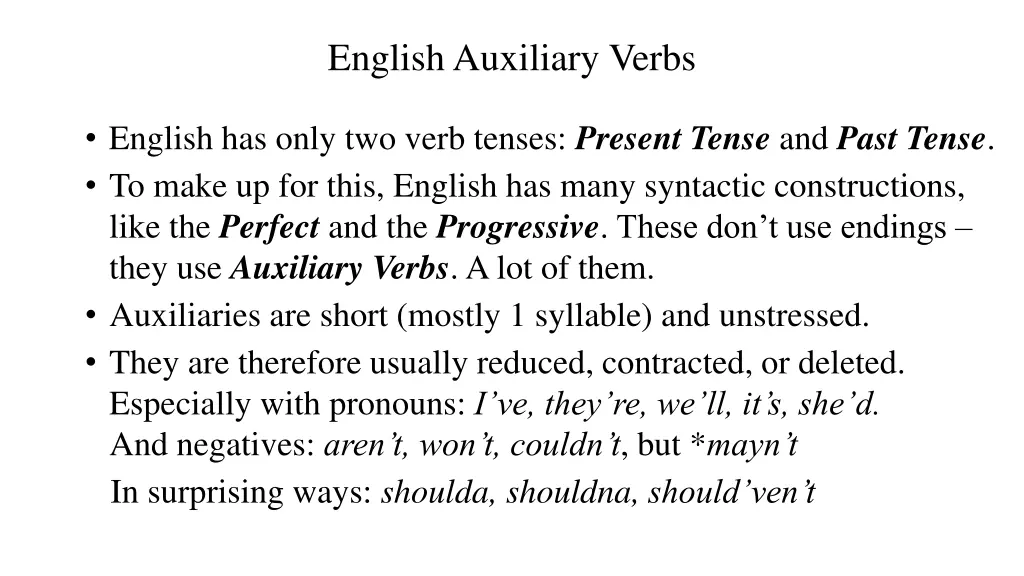
English Auxiliary Verbs: Constructions and Usage Guide
Learn about English auxiliary verbs and their various syntactic constructions, including do-support, verb chains, modals, perfect constructions, and progressive constructions. Understand how auxiliary verbs enhance the expression of verb tenses in English sentences.
Download Presentation

Please find below an Image/Link to download the presentation.
The content on the website is provided AS IS for your information and personal use only. It may not be sold, licensed, or shared on other websites without obtaining consent from the author. If you encounter any issues during the download, it is possible that the publisher has removed the file from their server.
You are allowed to download the files provided on this website for personal or commercial use, subject to the condition that they are used lawfully. All files are the property of their respective owners.
The content on the website is provided AS IS for your information and personal use only. It may not be sold, licensed, or shared on other websites without obtaining consent from the author.
E N D
Presentation Transcript
English Auxiliary Verbs English has only two verb tenses: Present Tense and Past Tense. To make up for this, English has many syntactic constructions, like the Perfect and the Progressive. These don t use endings they use Auxiliary Verbs. A lot of them. Auxiliaries are short (mostly 1 syllable) and unstressed. They are therefore usually reduced, contracted, or deleted. Especially with pronouns: I ve, they re, we ll, it s, she d. And negatives: aren t, won t, couldn t, but *mayn t In surprising ways: shoulda, shouldna, should ven t
English Auxiliary Verb 0: Do-Support There may just be the main verb; no auxiliary verbs at all. He left yesterday. Mary likes cilantro. But some constructions (negatives, questions) require auxiliaries *Left he yesterday? *Likes Mary cilantro? *He left not yesterday. *Mary likes not cilantro. In this case, auxiliary Do, followed by infinitive, is automatic. Did he leave yesterday? Does Mary like cilantro? He didn t leave yesterday. Mary doesn t like cilantro.
English Auxiliary Verb Chain There may be up to 5 verbs in a chain. The first verb has the tense: Present (think, goes) or Past (thought, went). The last verb is the main verb. He will be going. She may not have heard. They don t get along. The order is: Modal, Perfect have, Progressive be, Passive be. She will have been being interviewed all day. Infinitive Past Part Pres Part Past Participle
English Auxiliary Verb Chain 1: Modals The nine Modal auxiliary verbs are followed by an Infinitive can could might may shall should will would must Bill can read German. Frank may spend the night. His wife might not like that. Mary will beleaving soon. She will have been being interviewed all day. Bill could havelearned French. Her bags should havebeen delivered.
English Auxiliary Verb Chain 2: Perfect The Perfectauxiliaryhaveis followed by a Past Participle The Perfect Construction has four senses: TheUniversal sense: I've knownMax since 1960. The Existential sense: Ihaveread Beloved five times. The Stative/Resultative sense: I can't come to your party tonight - I'vecaught the flu. The Hot News sense: Malcolm X has just been assassinated.
English Auxiliary Verb Chain 3: Progressive TheProgressiveauxiliary beis followed by a Present Participle The Progressive Construction refers to an ongoing event;it applies only to Actions, but not to States, though that is a complex matter: He is running. He sthinking about it. He s renting that house. *I wasn t knowing that.*Are you liking it? *He s owning it. This restriction on the Progressive makes it a test for semantically Active predicates: *He is being tall vs He is being honest.
English Auxiliary Verb Chain 4: Passive ThePassiveauxiliary beis followed by a Past Participle. Passive requires a syntactic rule that switches the object to subject, so it can only operate in clauses with an object noun phrase. Like all syntactic rules, it doesn t change meaning, only context. Lin corrected the papers. Lin corrects the papers daily. I m correcting the papers. I ve corrected the papers. The papers werecorrected. The papers arecorrected daily. The papers are being corrected. The papers have been corrected.
